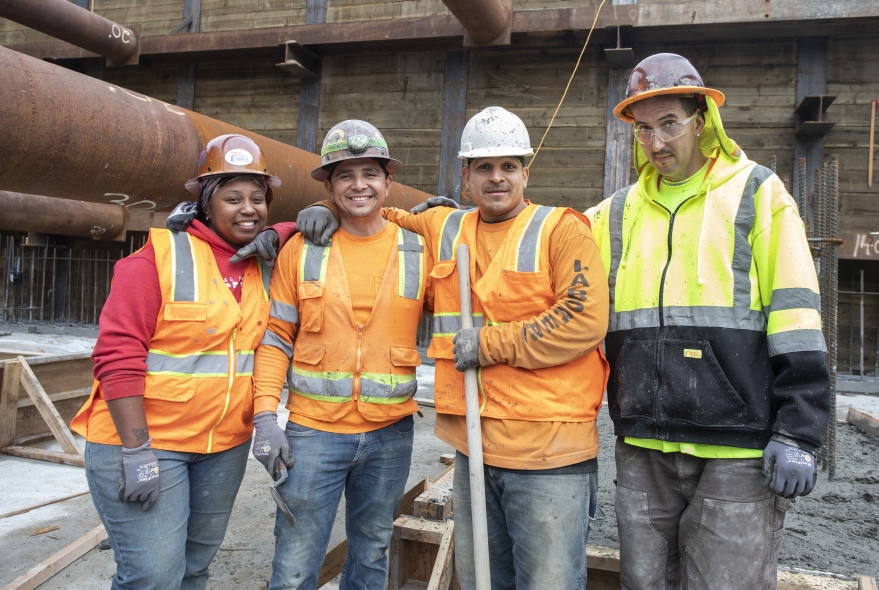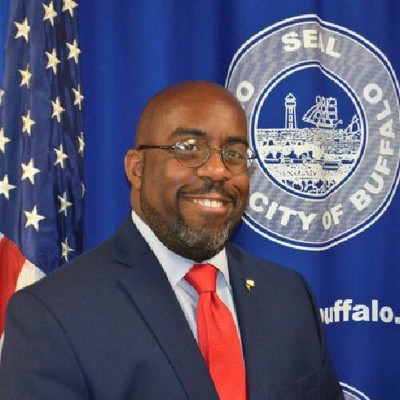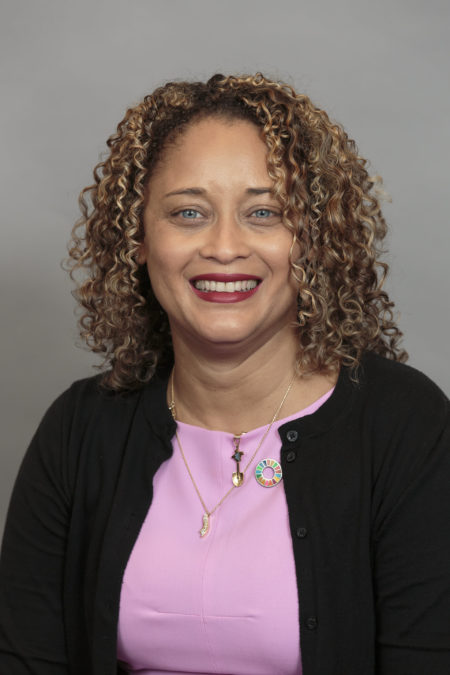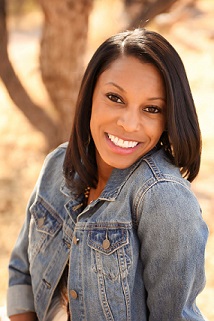
Having diversity, equity, and inclusion in all levels of the workforce is vital to innovation and growth in the water sector. WEF’s Board of Trustees has established a Diversity, Equity and Inclusion Subcommittee to provide guidance on programs, communications, and membership as the next step in the journey toward becoming as a fully diverse, inclusive, and equitable water organization.
On June 7, we’ll bring three Water Environment Federation House of Delegates members and WEF DEI Subcommittee members together for an in-depth discussion on Invisible Barriers – Diversity, Equity and Inclusion in Water. Visit AC.CWEA.org for details about this session and registering.
To get the conversation started, we asked the speakers two relevant questions. We look forward to learning more at the Annual Conference session on Why Diversity, moderated by CWEA Past President and current CWEA Diversity, Equity and Inclusion Chair, Debi Lewis on June 7.
OJ McFoy: Diversity is only important if you truly want to understand your customer and deliver successful projects for all. If not – if your OK with the Status Quo – Keep doing what you’re doing, but know that your competition is changing and the paradigm is dramatically shifting– and soon, you will be left with the scraps. A meteoric shift is taking place in all fields as it relates to race and gender, those clinging to structures built around yesteryears norms will be left wondering- what happened to our backlog? Plainly, I have little need for entities that do not reflect our values and the clients that we serve.
Ifetayo Venner: In the water sector we are responsible for delivering critical services to our communities that impact public health and the environment. When we as a sector reflect the diversity of our communities, we better understand and have insight into their needs; we make better decisions; and create more innovative, inclusive and equitable outcomes for infrastructure and services that quite literally impact people’s lives
Nikita Langenfelter: Diversity is the key to success. There are countless studies that show companies with a diverse workforce and a diverse management team are more productive and lead to higher revenues due to innovation. Having diversity, equity, and higher inclusion in all levels of the water workforce is vital to innovation and growth in the water sector.
OJ Mcfoy: This is an often asked question with an easy answer: A diverse community looks like the community you serve. If you’re a public entity- what is the demographic make-up of your service area? If you are a private consultant – Who are your major clients and what is the demographic make-up of their service area? In Buffalo, we are a majority minority community, so in 2006 when Mayor Byron W. Brown was elected and brought in a leadership change, we had a real problem at the Buffalo Sewer Authority as our leadership and workforce was 95% White – clearly unreflective of the community that we serve.
Ifetayo Vemner: A diverse community fully encompasses and embraces people with varying characteristics that may or may not be outwardly apparent, but that allow each person to provide a unique and valuable perspective based on their lived experience. An organization that is diverse and has fostered an inclusive and equitable space may sometimes feel uncomfortable and in conflict, but when they lean into this they create an environment minimizes group think, dares to be different and evolve rather than be stagnant, and fosters innovation and new ideas and approaches.
Nikita Lingenfelter: As Speaker of the House of Delegates (HOD) for the Water Environment Federation (WEF), I want to ensure that the HOD is an inclusive and diverse as possible. Diversity comes in all shapes and sizes, and the HOD needs to reflect the membership of WEF. After all, delegates are the representational body of the WEF membership. Currently, there are many under-represented groups inside of WEF and in the water industry that do not have a voice, seat, or representation at the WEF table. For WEF and the water industry to grow towards a brighter future, we need to have a diverse water community. In order to have a diverse water community, we need everyone at the table. “Alone we go fast, together we go far”. – African Proverb
 Oluwole A. (OJ) McFoy was appointed in 2015 to serve as the Buffalo Sewer Authority’s General Manager. He is a licensed Professional Engineer in the State of New York, bringing over 20 years of executive leadership, program management, and infrastructure design experience to regional water quality initiatives. McFoy has also held positions of Chief Engineer, responsible for executing the 20 year commitment to minimize the effects of combined sewer overflows on local waterways, and Chief Financial Officer, charged with managing the Authority’s bonds, investments and annual budget.
Oluwole A. (OJ) McFoy was appointed in 2015 to serve as the Buffalo Sewer Authority’s General Manager. He is a licensed Professional Engineer in the State of New York, bringing over 20 years of executive leadership, program management, and infrastructure design experience to regional water quality initiatives. McFoy has also held positions of Chief Engineer, responsible for executing the 20 year commitment to minimize the effects of combined sewer overflows on local waterways, and Chief Financial Officer, charged with managing the Authority’s bonds, investments and annual budget.
In 2007, McFoy was appointed Chairman of the Buffalo Water Board by Mayor Byron W. Brown, and continues to serve in this role. As Chairman, he led the 2010 management team transition, negotiating a $55 Million, 10-year public/private agreement with Veolia Water, to provide reliable and professional delivery of drinking water for the city.
In efforts to promote the value of water, McFoy serves as the New York Water and Environment Association’s representative to the Water Environment Federation House of Delegates, on the US Water Alliance’s Water Equity Taskforce, and was recently elected to the Board of the National Association of Clean Water Agencies.
 Ifetayo Venner is vice president of the 2020-21 Board of Trustees for the Water Environment Federation (WEF) and a Vice President and Wastewater Service Line Leader for Arcadis North America. As a wastewater treatment expert, she has been responsible for the management, planning, modeling, design, and startup of municipal wastewater treatment and reuse facilities throughout the United States
Ifetayo Venner is vice president of the 2020-21 Board of Trustees for the Water Environment Federation (WEF) and a Vice President and Wastewater Service Line Leader for Arcadis North America. As a wastewater treatment expert, she has been responsible for the management, planning, modeling, design, and startup of municipal wastewater treatment and reuse facilities throughout the United States
Ifetayo has been an active member of WEF since joining after college, participating in committees and task forces related to water resource recovery facility design, sustainability, and WEF governance. She has been championing DEI efforts within Arcadis and WEF as Board Sponsor for the Workforce DEI Task Force and DEI Board Subcommittee at WEF and Chair of the Black and Latinx Task Force at Arcadis.
 Nikita Lingenfelter is the current Speaker of the House of Delegates for WEF. She is the Staff Engineer for the Nevada Division of Environmental Protection (NDEP), Bureau of Water Pollution Control. She has worked for NDEP since 2006 where she started her career with the Bureau of Air Pollution Control.
Nikita Lingenfelter is the current Speaker of the House of Delegates for WEF. She is the Staff Engineer for the Nevada Division of Environmental Protection (NDEP), Bureau of Water Pollution Control. She has worked for NDEP since 2006 where she started her career with the Bureau of Air Pollution Control.
A WEF Member since 2015, Nikita has been an active member of the Nevada Water Environment Association where she served as President in 2017-2018. Nikita has served on WEF Committees, NWEA Committees, and is currently the Vice-Chair of the Diversity and Inclusion Task Force for WEF.